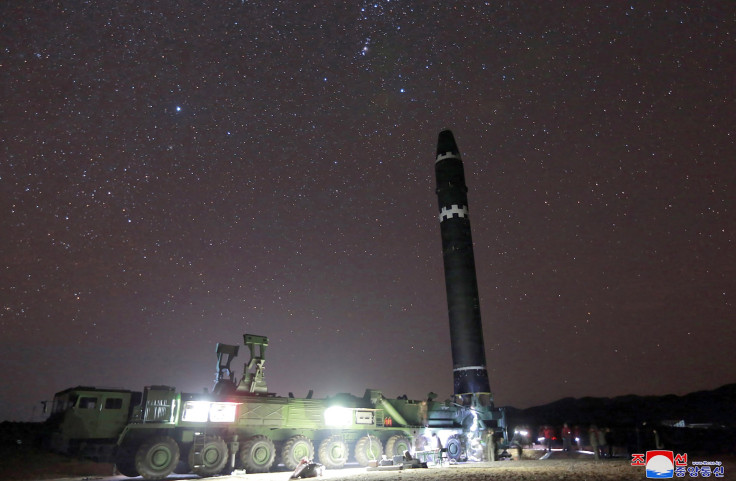North Korea Dismisses Rex Tillerson's Offer Of Talks 'Without Preconditions'

North Korea rejected U.S. Secretary of State Rex Tillerson’s latest offer of dialogue without pre-conditions on Tuesday. The rogue state said it has no interest in Washington’s scheme to get it to give up its nuclear program, Yonhap News Agency reported.
The offer of dialogue without pre-conditions was made by Tillerson to North Korea on Dec. 13. "Let's just meet. We can talk about the weather if you want," he said. "We can talk about whether it's going to be a square table or a round table if that's what you're excited about."
The offer seemed, at the time, like a possible shift in policy, although that was inconsistent with the Secretary of State saying a few days later that North Korea must halt its "threatening behavior" before any talks can begin.
The official newspaper of the Central Committee of the Workers' Party of Korea, Rodong Sinmun, said there has been no change in the stance of pursuing nuclear weapons, whether or not Washington has offered talks with no strings attached.
"The U.S. is trying to shift responsibility for tensions on the Korean Peninsula to us with its dialogue offensive," a commentary in the newspaper said. "The move is seen as being intended to set the tone for manipulating new U.N. Security Council resolutions that may include a maritime blockade if we do not accept dialogue aimed at discussing the abandonment of our nuclear weapons."
On Dec. 14 North Korea said the imposition of a naval blockade on their country would be considered an "act of war" by North Korean Leader Kim Jong Un.
"Should the United States and its followers try to enforce the naval blockade against our country, we will see it as an act of war and respond with merciless self-defensive counter-measures, as we have warned repeatedly," Korean Central News Agency reported on Friday, citing a foreign ministry spokesperson.
The KCNA report also said the country considered itself a responsible nuclear power and hence such a blockade would be considered a "wanton violation" of the country's sovereignty and dignity.
With its recent snub towards dialogue, Kim’s regime made it clear that it will not put its nuclear weapons and missiles on the negotiation table.
"There is no change in our stance that we will not budge an inch in our march toward strengthening our nuclear force," Rodong Sinmun reported.
Tillerson’s initial offer was met with praise by Russian President Vladimir Putin. "This is a very good sign that shows that the American leadership is moving towards an awareness of reality," Putin said during his annual end-of-year address on Dec. 14. "We believe that both sides need to stop aggravating the situation. North Korea is a closed country. It's enough for one firing [of a missile] from North Korea and the consequences will be catastrophic."
Chinese President Xi Jinping did not have a very different response. "The peninsula issue must, in the end, be resolved via dialogue and consultation," Xi was quoted as saying by state media.
On Monday the Russian foreign ministry called on the U.S. to withdraw its nuclear weapons from European territory.
"Russia returned all its nuclear weapons to its national territory. We believe that the same should have been done by the American side a long time ago," Mikhail Ulyanov, director of the Department for Nonproliferation and Arms Control at the Russian Foreign Ministry, said.
© Copyright IBTimes 2024. All rights reserved.












